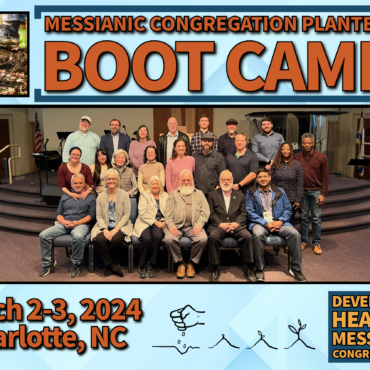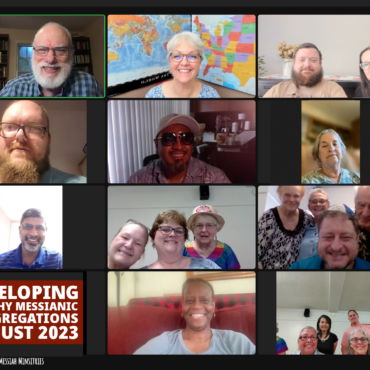Planting Priorities: Prayer and Worship

“lack of asking reveals a lack of dependence on Messiah”
Preparing for our upcoming Messianic Leaders Conference on Feb 19-20, if there’s one thing, I would want the attendees to grasp is that prayerlessness is powerlessness. We’re taught “you have not because you ask not” (James 4:2), so congregational failure because of a lack of support, resources, and people is from a lack of asking which reveals a lack of dependence on Messiah.
Pray for those who are still registering and will be attending. God wants His house to be a “house of prayer” (Isa 56:7) and He won’t bless something else!
“the ministry of prayer is best preparing us for our future home”
Prayer is the most important responsibility for a congregation, (and a family, community, etc.). In fact, this may be the only aspect of present congregational life that takes place in olam haba (the world to come). Considering this, the ministry of prayer is best preparing us for our future home.
Prayer and worship can be considered together because, whether it is in singing or speaking, both prayer and worship are praises and supplications directed to the Lord and intended to bless and bring honor to Him. The worship itself could be in an instrumental arrangement or a Capella, even so it is all to be praise and prayer unto HaShem.
Biblical teaching must be at the heart of prayer and worship ministry. The Samaritans did not have sound teaching, and thus it was wrong even if it was sincere (John 4:22-23).
“worship may bring the truth of God and His salvation deeper into our souls”
Worship has the additional by-product of further building up disciples in the truth. From a communications perspective, there are three means of carrying truth directly to the heart: humor, pathos, and music. People will often think about what they sang in worship.
The worship may bring the truth of God and His salvation deeper into their souls. Therefore, sound teaching must be the basis of our prayer and worship.
“all team members must desire deeper levels of prayer and worship.”
Worship teams need to be prayer leaders, that is men and women with a strong prayer life. A good voice and musical skills have value but are no substitute for prayer. An individual’s prayer and worship life helps foster his or her healthy relationship with the Lord, so all team members must desire deeper levels of prayer and worship. It is a matter both of personal growth and integrity before the Lord.
An Elder-Led Responsibility
This primacy of prayer is further seen in the history of our people.
“Moses’ arms coming down pictured the stopping of prayer…”
In Exodus 17, the first battle after Israel came out of Egypt was with the Amalekites. In this portion of Scripture, we find there was a division of labor. Joshua took the army and fought the Amalekites while Moses, along with Aaron and Hur went to the top of the mountain and with arms outstretched to God, we find them praying.
That prayer ministry was the key issue in the victory. Moses’ arms coming down pictured the stopping of prayer, that is, stopping our dependence on God and our abiding in Yeshua. At those times, the army of Joshua failed.
Prayer was and is the essential issue in victory – for Israel, for our homes, and for our congregations. It prepared us as a people, as to how we were to live in the land. Future victories would result from prayer.
“A lack of prayer can also be the cause for defeat for any congregation…”
In Exodus 17:14 Moses says, “Write this down for Joshua to read.” Why is Joshua singled out? Perhaps as an action-oriented man and leader of soldiers, he would need to be reminded to pray since his natural response might be to merely fight in his own strength.
When we read the book of Joshua, we see that Joshua only had two defeats. In Joshua 7, he prayed only after the defeat; and in Joshua 9, he did not pray before negotiating with an enemy. His two defeats resulted directly from a lack of prayer. A lack of prayer can also be the cause for defeat for any congregation which gets established; consequently, victory comes as leaders lead in prayer.
In The New Covenant
Paul tells Timothy that in the congregation there is to be prayer “first of all” (1 Timothy 2:1). Our community life is to be a beit tefilah, house of prayer. Benedictions, supplications, intercession, praise – all types of prayer ministries are part of our prayer priority. However, elder-led prayer is Biblically normative.
“Who knows the battles our “Joshuas” are fighting at home”
Men everywhere were to lift holy hands in worship, and so men are normally to be leading in prayer (1 Timothy 2:8). Why would they have to be instructed to do that?
Perhaps to show that prayer would be primary in how a man manages his own home (1 Timothy 3:5). If men are not leading in prayer at home, how can we expect them to lead in prayer in the congregation? Not only do we want to make sure we are praying as a community, we want the leaders to be praying for the community.
Who knows what battles our “Joshuas” are fighting at home, school and at work? In fact, one of the marks of spiritual leadership is that they lead in prayer.
Hearts for the Lord
“All prayer should be from the heart”
In the Biblical picture of heaven, the elders are forever falling down on their faces before God, leading in prayer (Rev. 4:10). They are prayer and worship leaders. Whether in the home or in the congregation, prayer prepares us for heavenly service like nothing else.
All prayer should be from the heart. In this regard, there is no distinction between formal liturgical prayers which the congregation prays and more informal prayers. However, people need to be taught to pray. The Messianic congregation is the place for people to grow as praying disciples.
Please pray for our planting conferences and the outreaches that bring the Good News “to the Jew first.”




Add Comment